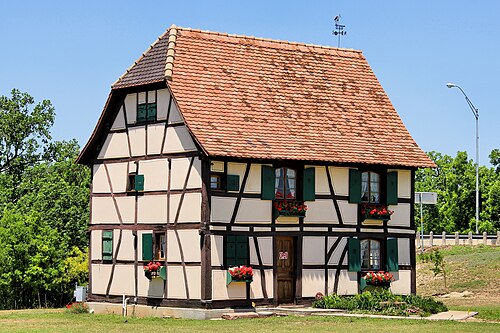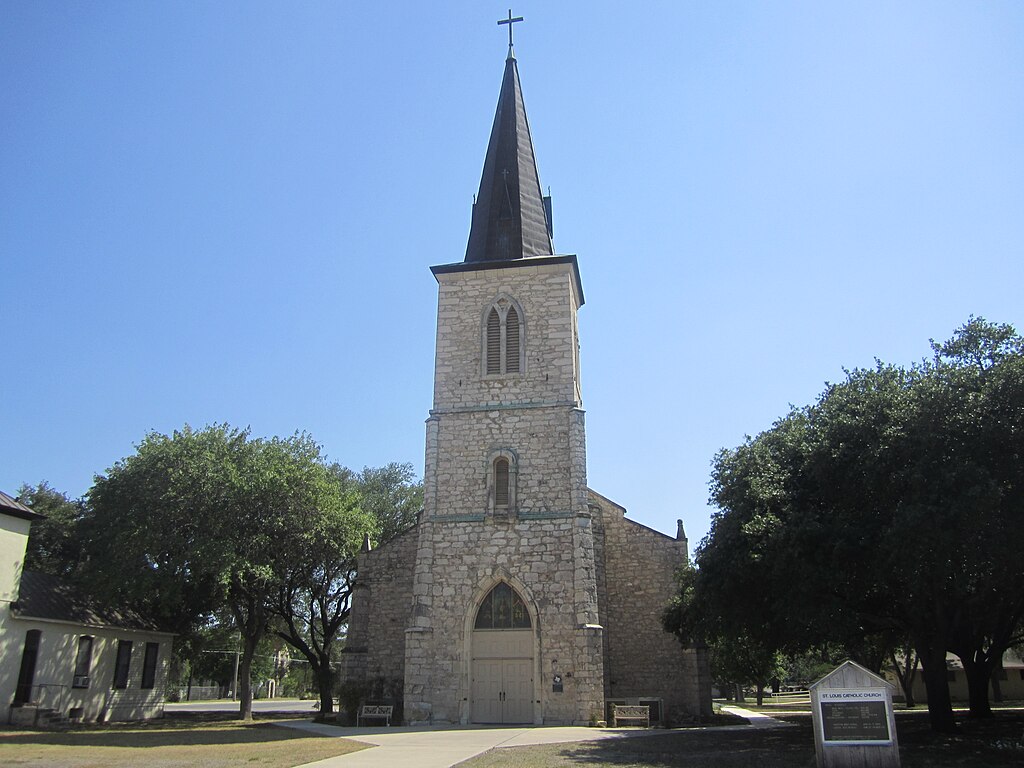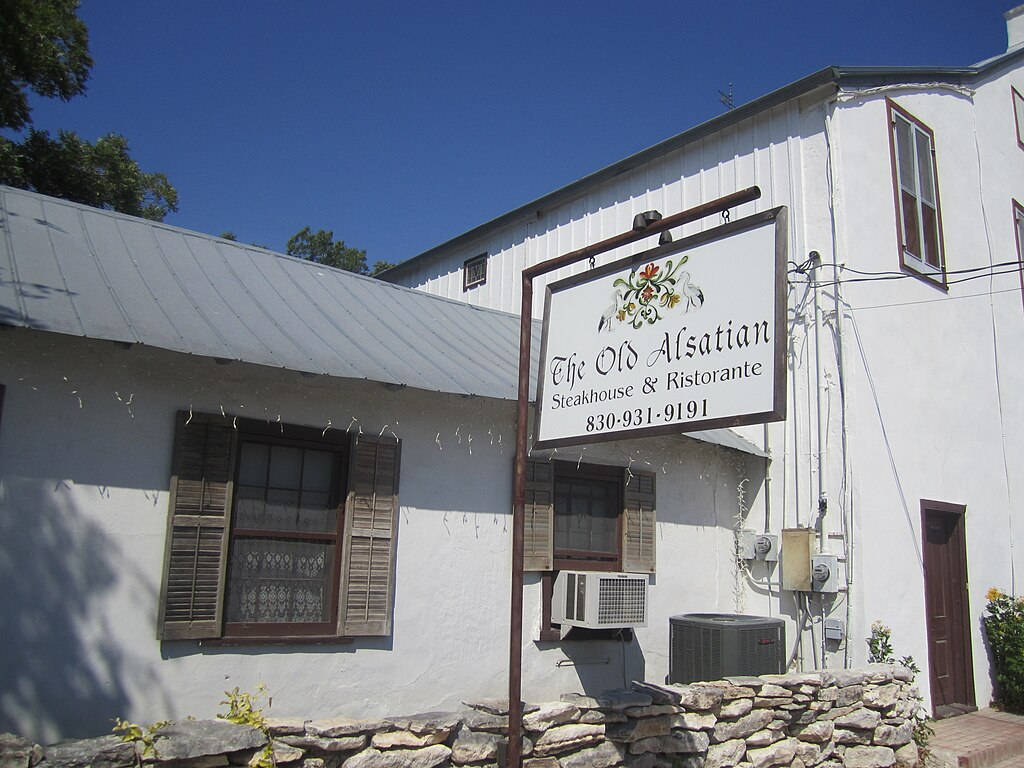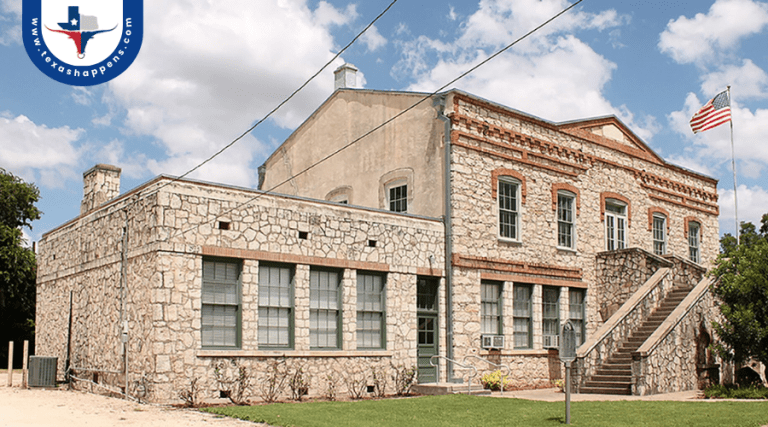Castroville, Texas, nicknamed “Little Alsace of Texas,” offers a unique European experience just 25 miles west of San Antonio.
Founded in 1844 by Henri Castro, this charming town showcases distinctive Alsatian architecture, including the reconstructed 17th-century Steinbach Haus and historic Landmark Inn.
You’ll discover preserved cultural heritage through annual St. Louis Day celebrations and European-inspired streetscapes. Wander through this small town’s steep-roofed cottages and stucco walls to uncover a slice of Alsace nestled in the Texas landscape.
Image: Renelibrary, Castroville City Hall Wiki, CC BY-SA 4.0
The Founding of Castroville: Henri Castro’s Vision in 1844
While many Texas towns emerged organically through westward expansion, Castroville stands apart as a deliberately planned European settlement. In 1842, Henri Castro, a French empresario of Portuguese-Jewish descent, secured a land grant from the Republic of Texas to bring Alsatian immigrants to the frontier.
By 1844, Castro had successfully settled hundreds of immigrants, founding Castroville as the westernmost colony at the time. Despite hardships including Comanche raids, drought, locusts, and cholera, these determined settlers established a community built in the Alsatian style.
In 1848, Castroville was designated Medina County’s first county seat, and town lots were distributed to settlers, anchoring its cultural and civic importance in early Texas history.
Unique Alsatian Architecture and Historic Buildings
A stroll through Castroville feels like stepping into a European village, thanks to its preserved Alsatian architecture. Throughout the town, you’ll see homes featuring steep-pitched roofs, thick limestone walls, and shutters—a reflection of the settlers’ heritage.
Three must-see buildings include:
- The Steinbach Haus – an authentic 17th-century Alsatian home disassembled in Wahlbach, France, and reassembled in Castroville in 2002
- Henri Castro’s homesite – although his original home no longer stands, a commemorative plaque marks the location and nearby buildings preserve the era’s architectural integrity
- The Landmark Inn – a restored 19th-century stagecoach stop turned state historic site, now operated by the Texas Historical Commission
The town’s St. Louis Catholic Church, built in 1868, complements these historic structures, creating a living museum of Alsatian-Texan culture.
The Landmark Inn and Steinbach Haus: Preserving Cultural Heritage

Image: Larry D. Moore, Steinbach house 2013, CC BY 4.0
Two cornerstones of Castroville’s cultural identity are the Landmark Inn State Historic Site and the Steinbach Haus Visitors Center. The Landmark Inn has provided lodging since the 1850s and today offers public tours, heritage exhibits, and overnight accommodations in its beautifully restored rooms.
The Steinbach Haus is a striking example of transatlantic heritage preservation. Originally constructed in Alsace between 1618–1648, the structure was donated by the French region of Alsace to Castroville in recognition of their shared ancestry. After arriving in pieces in 1998, it was rebuilt and opened to the public in 2002.
Together, these landmarks represent Castroville’s deep-rooted effort to preserve its unique European-American cultural legacy.
Castroville’s Journey From County Seat to Historic Destination
Castroville served as Medina County’s first county seat until 1892, when it was relocated to Hondo, following disputes over granting right-of-way access to a railroad line. After losing this civic status, the town declined in prominence and eventually disincorporated.
Key milestones in its revival include:
- Reincorporation in 1948
- Growth in population and tourism, reaching over 3,000 residents today
- Recognition as a National Historic District and Texas Historic Landmark
Preservation efforts led by local residents and historical societies have made Castroville a standout heritage destination in Texas.
Annual Traditions: St. Louis Day and Cultural Celebrations

Image: Billy Hathorn, St. Louis Catholic Church, Castroville, TX IMG 3253, CC BY 3.0
Each August, Castroville celebrates its French-Catholic heritage during St. Louis Day, held in honor of King Louis IX of France, the town’s patron saint. The event features a mass at St. Louis Catholic Church, live music, a large barbecue, and a biergarten, drawing thousands of visitors.
Other recurring events include:
- The Second Saturday Market – featuring artisan vendors, live music, and community charm
- Alsatian Christmas celebrations – with holiday lights, music, and cultural traditions in the historic district
These events reflect the community’s commitment to preserving and sharing its Alsatian identity with visitors.
Culinary Experiences: Where Alsatian and Texan Flavors Meet
Castroville’s culinary offerings showcase the unique blend of European and Texan traditions.
Highlights include:
- Haby’s Alsatian Bakery – a local institution since the 1970s, serving fresh strudels, rye breads, and Alsatian pastries
- Castroville Café – located in a historic home, offering hearty French-influenced Texas fare
- Blu Lacy Smokehouse – combining classic Texas barbecue with European spices and herbs
During festivals like St. Louis Day, visitors can sample Alsatian sausage, sauerkraut, and other traditional dishes made by community members.
Outdoor Recreation Along the Medina River
Set along the Medina River, Castroville offers ample opportunities for outdoor recreation. The 126-acre Castroville Regional Park includes:
- River access for swimming, kayaking, and fishing
- Scenic trails, sports courts, and RV/tent camping
Nearby, Paradise Canyon, located about 13 miles north, offers limestone bluffs, picnic areas, and a spring-fed stretch of the Medina River, perfect for day trips and water recreation.
These outdoor offerings enhance the town’s appeal as both a cultural and natural getaway.
Modern Castroville: Small-Town Charm With European Roots

Image: Billy Hathorn, The Old Alsatian Steakhouse, Castroville, TX IMG 3255, CC BY 3.0
Modern Castroville maintains its Alsatian aesthetic while embracing small-town Texas warmth. Visitors can enjoy:
-
Over 50 preserved historic homes within walking distance of the town square
-
Lodging at the Landmark Inn or other boutique stays
-
Local restaurants and shops celebrating the town’s Franco-Texan identity
Castroville remains one of the few places in the United States where Alsatian is still spoken, and where residents take pride in their European ancestry.


